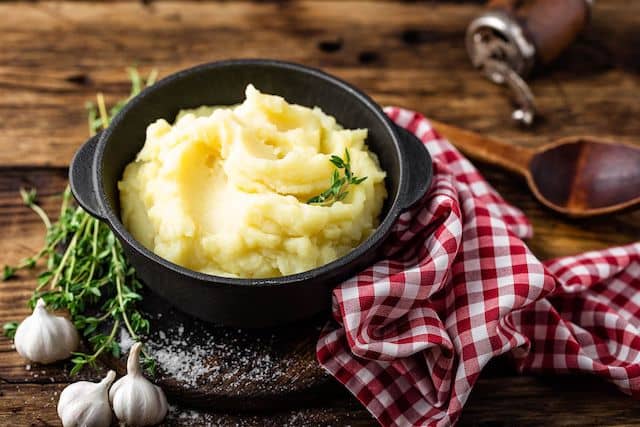A beloved comfort food of many, mashed potatoes is one of the most favorite recipes around the world. Potatoes are known to have several health benefits and should be added to the daily diet. However, those who follow strict diets often wonder whether they should consume mashed potatoes.
So, are mashed potatoes plant-based? Mashed potatoes can be plant based depending on how they are made. While a normal mashed potato dish contains butter and milk, it is possible to replace the dairy-based ingredients to make it plant-based and healthier. Plant based mashed potatoes can be made with unsweetened almond milk or coconut milk.

In this article, we talk more about plant-based mashed potatoes, their ingredients, benefits and more.
Why Are Mashed Potatoes Plant Based?
Mashed potatoes usually contain cooked potatoes, salt, milk, cream and butter. As the dish is primarily potatoes, it is fair to classify it as plant-based. While the dairy ingredients make it less healthy and far from being plant-based, it is possible to make plant-based mashed potatoes with the use of alternative ingredients.
A recipe that contains too much butter or cream is certainly not plant based. So it entirely depends on the ingredients used and the method of cooking.
What Are The Main Ingredients In Mashed Potatoes?
The standard mashed potatoes dish generally contains cooked potatoes in any variety and salt along with butter, milk or cream. Potatoes are boiled, peeled, chopped and mashed before adding other ingredients.
You can easily make plant-based mashed potatoes with unsweetened almond milk or coconut milk. Using vegan butter makes the recipe even healthier. Some recipes even use garlic, olive oil, vegetable broth and black pepper.
Mashed Potatoes Nutrition
Potatoes are highly nutritious and form an important part of any diet. However, mashed potatoes often use some fat and calorie-loaded ingredients. One serving of mashed potatoes offers about 18 grams of carbohydrates and 2 grams of protein. It provides about 6% of the daily value of fiber, promoting digestive health and weight management.
Butter and milk add calories and fat content to the dish made up of a fat-free vegetable. Half a cup of mashed potatoes gives 3-4 grams of fat. It is easy to make low-fat, plant-based mashed potatoes by using almond or coconut milk and olive oil.
A plant-based mashed potatoes serving gives 310 calories with 5.4 g protein, 3 g fiber and 14.6 g fat. The dish also provides nutrients like Calcium, Magnesium, Iron, Sodium, Phosphorus, Zinc, Potassium and vitamins A, D, K, C and E. It also contains B vitamins, folate, niacin, riboflavin and thiamine.
Mashed potatoes are not only rich in vitamins, minerals and other nutrients but also offer an excellent way to fulfill the daily requirement of carbs, protein and fiber.
Conclusion
So, mashed potatoes are one of the best foods to indulge in when following a plant-based diet. Just remember to use healthier ingredients to make sure you don’t load up on unnecessary calories and fats. When eating potatoes, see that you pay attention to portion control as well.
Most Popular Questions: